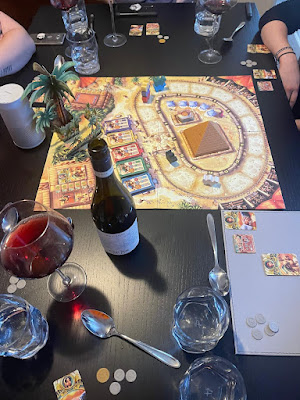It has been an eventful few days for Czech Games Edition (CGE) following their announcement of a new Harry Potter themed version of its long-running Codenames series; Codenames: Back to Hogwarts.
Following the announcement on BlueSky on 23rd July, CGE has come under fire from many trans-rights activists and fellow board game media content creators for choosing to release a game under the Harry Potter IP in 2025, the same year that the Harry Potter creator, JK Rowling, publicly boasted about using the royalties from her children's fiction empire to actively harm and campaign against trans-rights.
While there is a nuanced conversation to be had regarding the separation of the art from the artists, CGE has fallen under heavy criticism for failing to adequately engage with this dialogue. There are many ways in which people can engage with Harry Potter, if that is something they really want to do, that does not involve actively lining the pockets of a transphobe who is explicitly using the proceeds to attack one of the most marginalised communities in the world.
Initially CGE responded to the backlash by releasing a statement that many felt fell short of a proper acknowledgement of their concerns.
As part of the statement they said, "The vast world of magic featured in the upcoming Codenames has been a source of inspiration...
"We know many people around the world share the same sentiment about this universe, even among those who have been hurt by the public views and actions of its creator.
"Deciding whether those feelings should also transfer to the once-beloved world is up to everyone, and we fully respect and understand those who do not wish to engage with this game...
"As this is an ongoing conversation, we encourage everyone to approach discussion with care, empathy, and respect - both online and in person."
This statement failed to even provide the space for this "ongoing conversation", however, as comments were quickly turned off following an influx of accounts commenting that the company should do better than this half-hearted response.
A flurry of table top content creators has already vowed to boycott CGE titles until they address the transphobia inherent in releasing HP licenced material. Tom Brewster, editor in chief of Shut Up & Sit Down, told BoardGameWire that he fails "to see Harry Potter: Codenames as anything but a soulless cash grab that's tremendously insulting to the trans folks JK Rowling has been trying her best to oust from public life."
A full account of the various big names that have joined this boycott can be found on BoardGameWire.
As of 31st July, CGE has released another statement:
"We're grateful to everyone who engaged with us over the past few days and took the time to share their perspectives.
"At CGE, our aim was never to cause harm, and we acknowledge that, with our recent Codenames announcement, we have. We are working hard within our constraints to find the best way forward and we will update you as soon as we can.
"We understand that what we have done has caused distress, and are working towards a concrete solution with several members of the affected communities.
"Please bear with us as we figure this out."
It is not yet known how this statement will affect those who have already promised to boycott CGE titles.
Since the release of this second statement, there has been a deluge of JK Rowling apologists commenting in support of CGE and labeling the voicing of concerns for the trans community as "bullying". Let us be clear here, consumer criticism of a company for harmful decision making is not bullying. It is the right of everyone to stand up for their morals and it is impossible for a company to be bullied into reversing a decision such as this. Bullying has a clear dynamic of power imbalance that consumers do not have over corporations in a capitalist society.
Hand Limit promotes inclusivity in the table top community and has already made the decision not to cover any Harry Potter related titles. However, until CGE provide the community with a clear route forward, we have made the decision to remove Codenames from one of our upcoming features.
We believe that it is possible for art to be separated from the artist (case in point: the work of HP Lovecraft), but money cannot be separated from the bank account of someone who seeks harm to our friends in the trans community.
Trans Right Are Human Rights.

:strip_icc()/pic7013651.jpg)














.jpg)